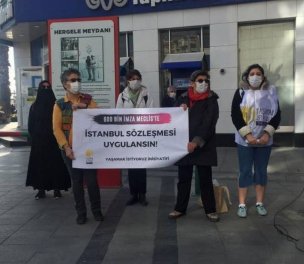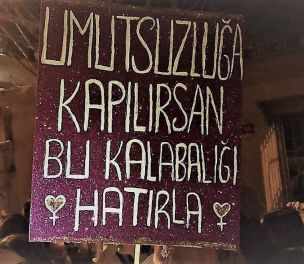Click to read the article in Turkish
Peoples' Democratic Party (HDP) İstanbul MP Züleyha Gülüm has submitted a Parliamentary question regarding Turkey's failure to effectively enforce the Convention on Preventing and Combating Violence Against Women and Domestic Violence, or the İstanbul Convention.
In her Parliamentary question addressed to Minister of Family, Labor and Social Services Zehra Zümrüt Selçuk, HDP's Züleyha Gülüm has raised concerns that the attitude of law enforcement officers towards women cause them to be aggrieved for the second time.
Gülüm has said, "As stipulated in the convention, the relevant authorities shall be in cooperation with independent women's organizations, feminists and LGBTI+ organizations, their expertise shall be included in institutional and social training activities and they shall be provided with incentives and budget; however, these organizations and groups have been cast away, their activities have been restricted and some of them have been even closed."
She has also underlined that especially in big cities, the number of Violence Prevention and Monitoring Centers (ŞÖNİM) and women's shelters has fallen short of meeting the needs of women subjected to male violence, failing to provide them with the necessary support so that they can lead an independent life and be economically empowered.
"On the other side, in handling male violence against women, law enforcement officers who do not take the aggrieved women's statements as a basis for investigations and protection requests, fail to show the necessary attention to the investigation and try to arbitrate between the women and their perpetrators have an attitude that leads women to be aggrieved for the second time," Gülüm has underlined further.
She has stressed that the ongoing practices of the judiciary legitimizing male violence against women and oriented towards impunity for male perpetrators must be prevented within the frame of the İstanbul Convention and legal mechanisms must be amended within this context.
'Are feminists, LGBTI+ organizations involved?'
Against this backdrop, HDP MP Züleyha Gülüm has asked a series of questions to Minister of Family, Labor and Social Services Selçuk:
"Why isn't the İstanbul Convention effectively enforced in Turkey to prevent, investigate, try and penalize male violence against women?
"Did you ministry offer any training activities aimed at a better understanding and an improved institutional and social awareness about gender equality, violence against women and discrimination within the scope of the İstanbul Convention and the Law no. 6284 on the Protection of Family and Prevention of Violence Against Women?
"Were independent women's organizations, feminists and LGBTI+ organizations involved in these training activities?
"Do you have any unique practices oriented towards preventing all types of violence against the women living in the rural areas, Kurdish women, women with disabilities, refugee women, trans women and lesbian women, as stipulated by the İstanbul Convention?
"Are the necessary sanctions imposed on state actors failing to fulfil their duties, tolerating violence and blaming the victims?
"Are you thinking of working collectively with independent women's organizations, feminists and LGBTI+ organizations to effectively enforce the İstanbul Convention?
"Does your Ministry create a detailed database with the aim of making statistics on crimes against women visible and waging an effective struggle against violence in this context?
"Are you planning to develop policies that will reinforce the measures compatible with the İstanbul Convention, which aims to eliminate gender inequality, male violence against women and discrimination?"
About İstanbul Convention
* Source: CoE The Council of Europe (CoE) "Convention on Preventing and Combating Violence Against Women and Domestic Violence", also known as "İstanbul Convention", is based on the understanding that violence against women is a form of gender-based violence that is committed against women because they are women. It is the obligation of the state to fully address it in all its forms and to take measures to prevent violence against women, protect its victims and prosecute the perpetrators. As of March 2019, it has been signed by 45 countries and the European Union (EU). On March 12, 2012, Turkey became the first country to ratify the Convention, followed by 33 other countries from 2013 to 2019 (Albania, Andorra, Austria, Belgium, Bosnia and Herzegovina, Croatia, Cyprus, Denmark, Finland, Estonia, France, Georgia, Germany, Greece, Iceland, Ireland, Italy, Luxembourg, Malta, Monaco, Montenegro, the Netherlands, Norway, North Macedonia, Poland, Romania, Portugal, San Marino, Serbia, Slovenia, Spain, Sweden, Switzerland). The Convention came into force on 1 August 2014. * Click here to read the full convention |
From İstanbul ConventionThe purposes, definitions and general obligations of the İstanbul Convention have been indicated in its first chapter of the as follows: Chapter I – Purposes, definitions, equality and non-discrimination, general obligations Article 1 – Purposes of the Convention The purposes of this Convention are to: a) protect women against all forms of violence, and prevent, prosecute and eliminate violence against women and domestic violence; b) contribute to the elimination of all forms of discrimination against women and promote substantive equality between women and men, including by empowering women; c) design a comprehensive framework, policies and measures for the protection of and assistance to all victims of violence against women and domestic violence; d) promote international co-operation with a view to eliminating violence against women and domestic violence; e) provide support and assistance to organisations and law enforcement agencies to effectively co-operate in order to adopt an integrated approach to eliminating violence against women and domestic violence. In order to ensure effective implementation of its provisions by the Parties, this Convention establishes a specific monitoring mechanism. Article 2 – Scope of the Convention This Convention shall apply to all forms of violence against women, including domestic violence, which affects women disproportionately. Parties are encouraged to apply this Convention to all victims of domestic violence. Parties shall pay particular attention to women victims of gender-based violence in implementing the provisions of this Convention. This Convention shall apply in times of peace and in situations of armed conflict. Article 3 – Definitions For the purpose of this Convention: a) "violence against women" is understood as a violation of human rights and a form of discrimination against women and shall mean all acts of gender-based violence that result in, or are likely to result in, physical, sexual, psychological or economic harm or suffering to women, including threats of such acts, coercion or arbitrary deprivation of liberty, whether occurring in public or in private life; b) "domestic violence" shall mean all acts of physical, sexual, psychological or economic violence that occur within the family or domestic unit or between former or current spouses or partners, whether or not the perpetrator shares or has shared the same residence with the victim; c) "gender" shall mean the socially constructed roles, behaviours, activities and attributes that a given society considers appropriate for women and men; d) "gender-based violence against women" shall mean violence that is directed against a woman because she is a woman or that affects women disproportionately; e) "victim" shall mean any natural person who is subject to the conduct specified in points a and b; f) "women" includes girls under the age of 18. Article 4 – Fundamental rights, equality and non-discrimination Parties shall take the necessary legislative and other measures to promote and protect the right for everyone, particularly women, to live free from violence in both the public and the private sphere. Parties condemn all forms of discrimination against women and take, without delay, the necessary legislative and other measures to prevent it, in particular by: –embodying in their national constitutions or other appropriate legislation the principle of equality between women and men and ensuring the practical realisation of this principle; –prohibiting discrimination against women, including through the use of sanctions, where appropriate; –abolishing laws and practices which discriminate against women. The implementation of the provisions of this Convention by the Parties, in particular measures to protect the rights of victims, shall be secured without discrimination on any ground such as sex, gender, race, colour, language, religion, political or other opinion, national or social origin, association with a national minority, property, birth, sexual orientation, gender identity, age, state of health, disability, marital status, migrant or refugee status, or other status. Special measures that are necessary to prevent and protect women from gender-based violence shall not be considered discrimination under the terms of this Convention. Article 5 – State obligations and due diligence Parties shall refrain from engaging in any act of violence against women and ensure that State authorities, officials, agents, institutions and other actors acting on behalf of the State act in conformity with this obligation. Parties shall take the necessary legislative and other measures to exercise due diligence to prevent, investigate, punish and provide reparation for acts of violence covered by the scope of this Convention that are perpetrated by non-State actors. Article 6 – Gender-sensitive policies Parties shall undertake to include a gender perspective in the implementation and evaluation of the impact of the provisions of this Convention and to promote and effectively implement policies of equality between women and men and the empowerment of women. |
(EMK/SD)










